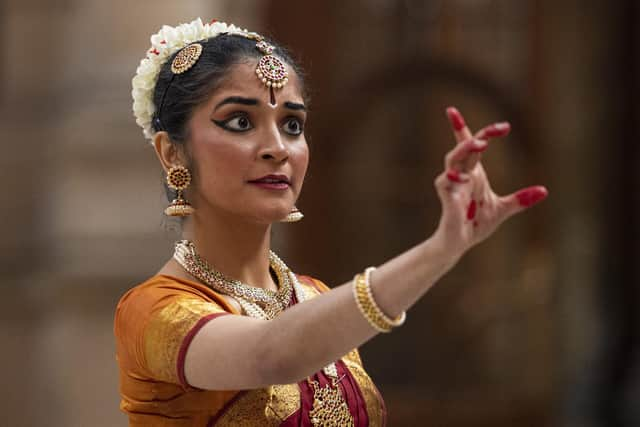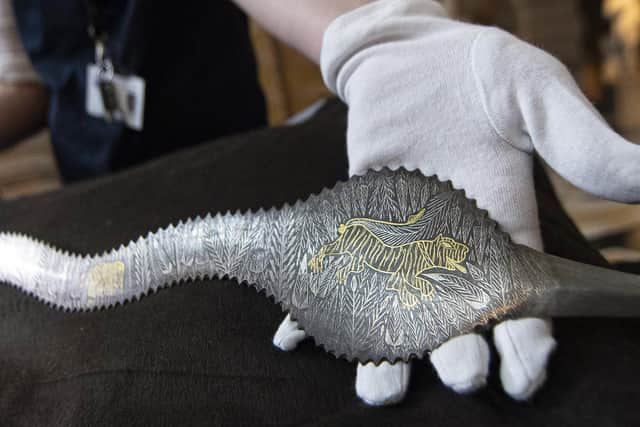Glasgow 'rights a wrong' and returns stolen artefacts to India
Seven artefacts taken from India in the 19th century are now being returned by Glasgow Museums, where they have sat in collections after being gifted to the city.
Among the antiquities are a ceremonial Indo-Persian tulwar sword, which is believed to date back to the 14th century, and an 11th-century carved stone door jamb taken from a Hindu temple in Kanpur.
Advertisement
Hide AdAdvertisement
Hide AdThe door jamb is one of six of items stolen from temples and shrines in Northern India during the 19th century. The seventh artefact was stolen from its owner and sold, before being gifted to the city’s museums.
On Friday, dignitaries from the High Commission of India were welcomed to the city for a ceremony that witnessed the transfer of ownership of the artefacts.
Duncan Dornan, head of museums and collections at Glasgow Life, said: "The transfer of ownership of the Indian antiquities symbolises a significant step for Glasgow, with the city continuing its positive repatriation history by ensuring these cultural artefacts are placed back in the hands of their legitimate owners."
Glasgow Life Museums said it was the first museum service in the UK to repatriate artefacts to India.


Sujit Ghosh, acting Indian High Commissioner, welcomed the return of the items.
"These artefacts are an integral part of our civilisational heritage and will now be sent back home,” he said. “We express our appreciation to all the stakeholders who made this possible, especially Glasgow Life and Glasgow City Council.”
Glasgow Life has been working on the repatriation of the artefacts with the High Commission of India in London since January last year.
Bailie Annette Christie, the chairwoman of Glasgow Life, said: "The agreement reached with the government of India is another example of Glasgow's commitment to addressing past wrongs and remaining transparent when explaining how objects arrived in the city's museum collections."


Advertisement
Hide AdAdvertisement
Hide AdGlasgow is also set to return a number of other items to countries across the world, including 19 Benin Bronzes to Nigeria.
The artefacts, which were acquired as gifts, bequests and at auction, were taken from sacred sites and ceremonial buildings during the punitive Benin Expedition of 1897.
Thousands of metal and ivory sculptures and carvings were looted by British forces during the destruction of Benin City in present-day Nigeria.
It follows the repatriation of a Benin Bronze from Aberdeen University, which reached an agreement with Nigeria in March last year to return one of the cultural treasures, which was valued at hundreds of thousands of pounds.
Meanwhile, Glasgow will hand back some 25 Lakota and Oceti Sakowin ancestor cultural treasures to the Cheyenne River Sioux and Oglala Sioux tribes of South Dakota.
They were sold and donated to Glasgow's museums by George Crager, an interpreter for the Buffalo Bill Wild West Show who visited the city in 1892 .
Some of these objects were taken from the Wounded Knee Massacre site following the slaughter of between 150 and 300 Lakota Indians by United States Army troops in south-western South Dakota in 1890.
Comments
Want to join the conversation? Please or to comment on this article.
